
Choosing the Best CRM Software for Small to Large Enterprises
Customer Relationship Management (CRM) software has become an indispensable tool for businesses of all sizes. Whether you’re a small startup, a growing mid-sized company, or a large enterprise, choosing the right CRM software can streamline operations, enhance customer relationships, and drive revenue. But with so many options available, finding the CRM that best suits your needs can be overwhelming. In this guide, we’ll explore how to choose the best CRM software for small, medium, and large enterprises, taking into account essential features, scalability, and integration needs.
Why CRM Software is Critical for Businesses of All Sizes
CRM software serves as a central repository for customer data, enabling businesses to manage interactions, track sales, and analyze customer behavior. The best CRMs provide tools to automate routine tasks, foster collaboration across departments, and provide insights to improve customer experiences. Here’s why businesses of all sizes need a CRM:
- Enhanced Customer Relationships: A CRM allows for personalized customer interactions, which is key to building long-term relationships.
- Improved Team Efficiency: CRMs automate repetitive tasks, allowing teams to focus on high-impact activities.
- Data-Driven Decision-Making: With access to customer data and analytics, teams can make better business decisions.
- Scalability and Flexibility: A good CRM grows with your business, adapting to changing needs without compromising performance.
Key CRM Features to Look For
When evaluating CRM options, focus on features that align with your organization’s size, structure, and business goals. Some essential features include:
- Contact and Account Management: Manage customer data for organized, centralized access across teams.
- Sales Pipeline Management: Track deals from lead to close, making it easy to forecast sales and monitor progress.
- Automation: Automate tasks like email follow-ups, lead assignments, and data entry, saving time and reducing errors.
- Analytics and Reporting: Generate reports to measure KPIs, track sales performance, and assess customer interactions.
- Customizability: Customize workflows, fields, and interfaces to match your organization’s unique requirements.
- Integrations: Look for CRMs that connect seamlessly with other tools your team relies on, like email platforms, marketing software, and customer support tools.
CRM Solutions for Small, Medium, and Large Enterprises
Let’s explore top CRM options, categorized by business size to help you find the best fit.
CRM Software for Small Businesses
Small businesses typically benefit from CRMs that are easy to set up, affordable, and don’t require extensive training. Here are a few options ideal for small enterprises:
- HubSpot CRM
- Overview: HubSpot CRM offers a free version with essential CRM features and paid plans for advanced tools. It’s user-friendly, making it ideal for small businesses new to CRM software.
- Key Features: Contact management, email tracking, task automation, and sales pipeline management.
- Pros: Free tier available, easy setup, and user-friendly interface.
- Best For: Small businesses looking for an entry-level CRM without a large upfront investment.
- Overview: HubSpot CRM offers a free version with essential CRM features and paid plans for advanced tools. It’s user-friendly, making it ideal for small businesses new to CRM software.
- Zoho CRM
- Overview: Zoho CRM is an affordable, all-in-one solution that includes tools for sales automation, marketing, and customer support.
- Key Features: Customizable workflows, AI-driven sales insights, and integration with other Zoho products.
- Pros: Flexible pricing, extensive customization options, and integration capabilities.
- Best For: Small businesses needing a cost-effective, scalable CRM with customizable features.
- Overview: Zoho CRM is an affordable, all-in-one solution that includes tools for sales automation, marketing, and customer support.
- Talygen CRM
- Overview: Talygen CRM is a versatile solution that offers comprehensive functionality for small businesses, including project management, time tracking, and client management. Talygen’s user-friendly platform is designed to grow with the needs of small businesses.
- Key Features: Contact management, task automation, project tracking, client communication, and cloud-based storage.
- Pros: Easy to use, affordable, and integrates with Talygen’s suite of business management tools.
- Best For: Small businesses looking for a multipurpose CRM that combines CRM, project management, and time tracking in one platform.
- Overview: Talygen CRM is a versatile solution that offers comprehensive functionality for small businesses, including project management, time tracking, and client management. Talygen’s user-friendly platform is designed to grow with the needs of small businesses.
CRM Software for Mid-Sized Businesses
As businesses grow, they typically need more advanced CRM features, such as workflow automation, deeper analytics, and customization options. Here are some CRMs well-suited for mid-sized organizations:
- Pipedrive
- Overview: Pipedrive is a sales-focused CRM known for its visual sales pipeline and intuitive design. It offers powerful tools for managing sales and improving deal flow.
- Key Features: Customizable pipelines, automated lead scoring, and performance insights.
- Pros: Easy-to-use interface, customizable sales workflows, and robust automation features.
- Best For: Mid-sized sales teams focused on improving deal closure rates and tracking performance.
- Overview: Pipedrive is a sales-focused CRM known for its visual sales pipeline and intuitive design. It offers powerful tools for managing sales and improving deal flow.
- Salesforce Essentials
- Overview: Salesforce Essentials is a scaled-down version of Salesforce designed for small to mid-sized businesses. It includes core CRM features with the ability to scale as the business grows.
- Key Features: Contact and account management, task automation, and mobile access.
- Pros: Access to Salesforce’s powerful ecosystem, scalable, and integration-ready.
- Best For: Mid-sized companies that want an entry-level option with the potential to expand within the Salesforce platform.
- Overview: Salesforce Essentials is a scaled-down version of Salesforce designed for small to mid-sized businesses. It includes core CRM features with the ability to scale as the business grows.
CRM Software for Large Enterprises
Large enterprises need CRM solutions that can handle large volumes of data, offer deep customization, and support complex workflows. Here are CRM options built for scalability and advanced functionality:
- Salesforce CRM
- Overview: Salesforce is a leading enterprise CRM solution with extensive customization, integration options, and a robust ecosystem of add-ons. It’s highly scalable, making it ideal for complex business needs.
- Key Features: Customizable dashboards, AI-powered analytics, customer support tools, and marketing automation.
- Pros: Extremely customizable, strong reporting capabilities, and industry-specific solutions.
- Best For: Large organizations needing a comprehensive, customizable CRM with extensive integrations.
- Overview: Salesforce is a leading enterprise CRM solution with extensive customization, integration options, and a robust ecosystem of add-ons. It’s highly scalable, making it ideal for complex business needs.
- Microsoft Dynamics 365
- Overview: Microsoft Dynamics 365 is an all-in-one solution offering CRM and ERP functionality. It integrates seamlessly with other Microsoft products, providing powerful tools for large enterprises.
- Key Features: Customer insights, sales and marketing automation, AI-driven recommendations, and ERP integration.
- Pros: Unified CRM and ERP capabilities, strong analytics, and seamless integration with Microsoft tools.
- Best For: Large enterprises requiring both CRM and ERP solutions in a single platform.
- Overview: Microsoft Dynamics 365 is an all-in-one solution offering CRM and ERP functionality. It integrates seamlessly with other Microsoft products, providing powerful tools for large enterprises.
- Talygen CRM
- Overview: Talygen CRM also offers an enterprise-level solution that integrates CRM capabilities with tools for project management, HR management, and billing. Designed for scalability, it helps larger organizations manage complex projects, track client data, and optimize team workflows.
- Key Features: Client relationship management, project tracking, time tracking, employee management, invoicing, and cloud-based data access.
- Pros: Robust feature set, multi-department functionality, easy integration with other business tools, and scalable support for enterprise needs.
- Best For: Large organizations looking for a comprehensive, integrated solution that combines CRM, project, and team management in one platform.
- Overview: Talygen CRM also offers an enterprise-level solution that integrates CRM capabilities with tools for project management, HR management, and billing. Designed for scalability, it helps larger organizations manage complex projects, track client data, and optimize team workflows.
Key Considerations When Choosing a CRM
Selecting the right CRM involves more than just comparing features. Here are a few essential considerations to keep in mind:
- Scalability: Choose a CRM that can grow with your business. For example, small businesses might start with HubSpot CRM and upgrade as needs increase.
- User Experience: A CRM should be user-friendly to encourage adoption. Complex systems with steep learning curves can hinder productivity.
- Integration with Existing Tools: Make sure the CRM integrates with your current software stack. For instance, if you rely on Microsoft products, Microsoft Dynamics 365 may be a better fit.
- Customization: Larger businesses often need highly customizable CRMs to match specific workflows. CRMs like Salesforce and Microsoft Dynamics 365 provide extensive customization options.
- Cost: CRM pricing models vary, so choose a plan that fits your budget while providing room for growth. Many CRMs offer tiered pricing based on features and the number of users.
Final Thoughts
The right CRM software can be a game-changer for businesses of all sizes, providing a central hub for managing customer relationships and streamlining operations. Small businesses may benefit from easy-to-use, affordable solutions like HubSpot or Zoho, while mid-sized companies might prefer the flexibility of Pipedrive or Salesforce Essentials. For large enterprises, Salesforce, Microsoft Dynamics 365, and Talygen offer advanced features and extensive scalability. By understanding your organization’s specific needs and focusing on essential features, you can select a CRM that supports growth, enhances customer satisfaction, and ultimately boosts business success.



